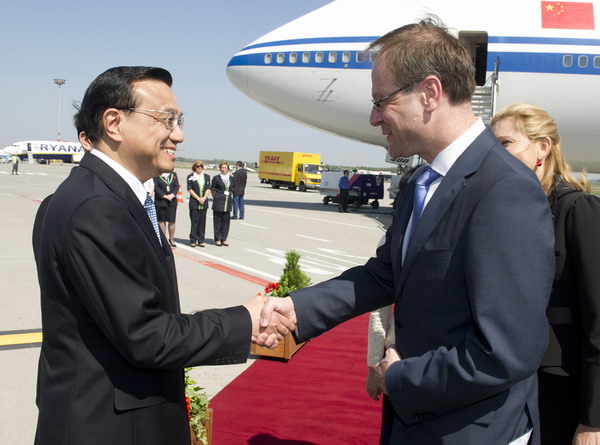

China will invest more in Hungary and import more high-tech goods from the country, Vice-Premier Li Keqiang said on Monday, at the beginning of his two-day visit to the Central European country.
|
 Visiting Chinese Vice-Premier Li Keqiang (L) shakes hands with Hungarian acting President Laszlo Kover?in Budapest on Monday. [Photo/Xinhua] |
With increasing exchanges of high-level visits, Sino-Hungarian political mutual trust has been promoted steadily while economic and trade relations are making remarkable progress, he said in a statement after arriving in Budapest.
On Monday, Li met with Tibor Navracsics, deputy prime minister of Hungary, and Laszlo Kover, acting president of Hungary.
| ||||
The two nations are expected to sign a package of cooperative agreements in finance, agro-science, small and medium-sized enterprises and information technology sectors.
Despite the financial crisis and global economic slowdown, China-Hungary trade volume reached a record high of more than $9 billion last year, up by 6.2 percent year-on-year.
China is Hungary's largest trade partner outside the European Union. Hungary is the largest destination for Chinese investments in Central and Eastern Europe.
 |
|
Tibor Navracsics, deputy prime minister of Hungary, greets Vice-Premier Li Keqiang upon his arrival at an airport in Budapest on Monday. [Photo/Xinhua] |
"China will actively promote the expansion of qualified Chinese enterprises into Hungary, and we also expect to import more goods from Hungary, including machinery, electronics goods, electrical products and agro-goods," Li said.
According to Ma Zhengang, former director of the China Institute of International Studies, China's investment and efforts to increase imports are hugely important to Hungary, which is struggling amid the debt crisis.
"It is expected that the economic cooperation between China and Hungary could be sustained for years," Ma said. "And the two countries could cooperate, especially in technology industries."
Li said China's economic growth and its model for the transformation of its economic growth present business opportunities for Hungary.
"In the next five years, China's service industry in its GDP will grow by 4 percentage points, and its energy consumption intensity will drop by 16 percent. The growth of the nation's household incomes will keep pace with that of GDP during the period," Li said.
Guan Chengyuan, former Chinese ambassador to the European Union, said, "China and the new member nations of the EU, including Hungary, are highly complementary economically and the potential for cooperation is huge."
"They need capital, technology and market, and China could provide all of these. Conversely, China expects more companies to go overseas, and Hungary could be a good place to invest."
In 2004, Hungary joined the European Union, and it has been on the EU's excessive-deficit list since then.
The ongoing debt crisis slowed Hungary's economy and increased its debts.
But the country can "safely" meet its deficit targets of 2.5 percent of GDP in 2012 and 2.2 percent in 2013, the Hungarian government said. The government also expects the economy to expand by 0.1 percent this year and 1.6 percent in 2013.
"Hungary is striving to rid itself of the crisis and is committed to sustaining social development through pragmatic efforts," Li said.
Last year, when Premier Wen Jiabao visited Hungary, he said China was willing to buy Hungarian government bonds.
Contact the writers at dingqingfen@chinadaily.com.cn and chengguangjin@chinadaily.com.cn